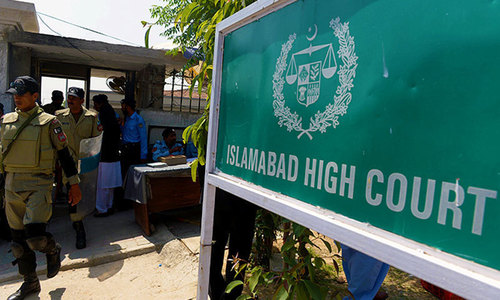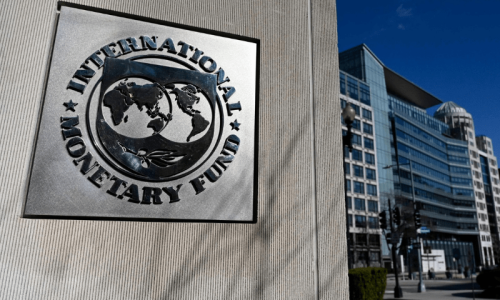ISLAMABAD: Litigation over service-related matters and frivolous petitions are adding to the burden on the country’s constitutional courts, hampering the smooth administration of justice as petitioners have to wait decades for a decision in their cases.
Established in January 2011, the Islamabad High Court has often seen relatively-unknown lawyers filing person-specific petitions in order to gain media attention. Annoyed by the practice, some IHC judges have even fined such frivolous petitioners for wasting the court’s time.
According to figures from the Law and Justice Commission of Pakistan, cases pending before all high courts increased from 2016 to 2017. At least 293,316 cases are currently pending before the five high courts: 147,633 in the Lahore High Court (LHC), 93,404 cases before the Sindh High Court (SHC), 29,525 cases at the Peshawar High Court (PHC), 6,510 in the Balochistan High Court (BHC) and 16,244 before the Islamabad High Court (IHC).
A year earlier, the tally was as follows: LHC 159,577, SHC 84,077, PHC 30,730, BHC 6,110 and 13,789 at the IHC.
Justice Minallah has already suggested formation of departmental service tribunals in statutory institutions to alleviate superior judiciary’s burden
The 3,500-case spike before the IHC, legal experts say, was mainly down to ‘frivolous litigation’ and service-related cases filed by bureaucrats.
For instance, a petition against former chief justice Iftikhar Mohammad Chaudhry’s bulletproof vehicle was thrown out and the petitioner, Riaz Hanif Rahi, was fined.
Another lawyer, Raees Abdul Wahid, filed petitions against Bilawal Bhutto-Zardari for adding ‘Bhutto’ to his name, while in another petition; he asked the court to place Nawaz Sharif and his family on the exit control list (ECL).
However, in most cases, the high court bar comes to their rescue and these lawyers are still carrying on this practice today. Most of the petitions declared frivolous were filed under Article 199 of the Constitution, under which a high court may take up a matter when there is “no other adequate remedy is provided by law.”
As per the interpretation of the superior judiciary, “the jurisdiction of (a high court) under Article 199 of the Constitution is of extraordinary nature. The Constitution has conferred the power on high courts for enforcement of fundamental rights.”
The power under Article 199 includes issuance of orders, directions or writs of five kinds: habeas corpus (through which a person can report an unlawful detention or imprisonment to a court), mandamus (a judicial writ issued as a command to an inferior court or ordering a person to perform a public or statutory duty), certiorari (appeal against lower court order), prohibition (a writ directing a subordinate to stop doing something the law prohibits) and quo warranto (requiring a person to show by what warrant an office is held).
In the US and UK, senior lawyer Anis Jilani told Dawn, the petitioners have to pay the cost of litigation in instances where they are unable to prove their case against the respondents. “Such a deterrent discourages the filing of frivolous petitions,” he suggested.
Departmental tribunals
In service-related matters, Advocate Jilani said that if a petitioner invokes Article 199 against a departmental order, the high court would be reduced to as service tribunal, since there are scores of such cases.
He said that federal government employees could file service-related petitions before the Federal Services Tribunal (FST) under Article 212 of the Constitution.
However, employees of organizations such as the Capital Development Authority (CDA), Pakistan Television Corporation (PTV) and other statutory bodies, which came into existence through an act of parliament, cannot He suggested that the high court could pass a judgment authorising the FST to establish an independent section to deal with such cases.
A verdict announced by IHC Justice Athar Minallah in Feb 2015 discussed this issue in length and suggested that statutory bodies can establish an exclusive tribunal to redress the grievances of its own employees.
Deciding a petition filed by CDA employee Abdul Qayyum, Justice Minallah pointed out that “the jurisdiction [of a high court] being discretionary and extraordinary is exercised in grave cases rather than in routine.”
In the judgment, the learned judge explained how the service related cases take years to decide.
He observed that it was something even “the framers of the Constitution had surely not imagined that employees… [could] be resorting to invoking the extra ordinary constitutional jurisdiction under Article 199 in such a large number.”
He noted that invoking Article 199 was also expensive for the government employee, as most employees, particularly in the lower grades, find it virtually impossible to approach the high court. Those who are fortunate to bear the high cost of litigation also have to wait for years even if the matter would decide in their favor since “the organisations invariably drag the employees to a higher judicial forum.”
However, for some lawyers, the establishment of tribunals at the departmental level could squeeze the jurisdiction of high court.
Mohammad Arif Chaudhry, the current president of the IHC Bar Association, said that there was a need to increase the number of high court judges and establish special benches for service-related cases of statutory and non-statutory organizations.
According to him, the outcome of a legal suit is worth more than the cost of litigation.
Published in Dawn, December 29th, 2017













































